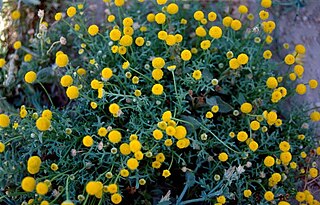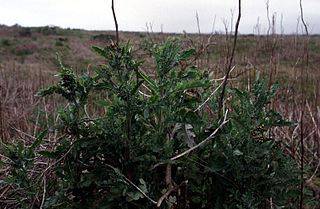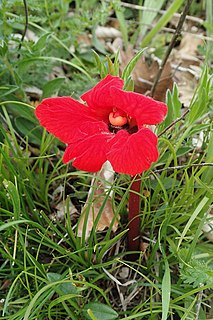
Cytisus is a genus of flowering plants in the family Fabaceae, native to open sites in Europe, western Asia and North Africa. It belongs to the subfamily Faboideae, and is one of several genera in the tribe Genisteae which are commonly called brooms. They are shrubs producing masses of brightly coloured, pea-like flowers, often highly fragrant. Members of the segregate genera, Calicotome, Chamaecytisus, and Lembotropis are sometimes included in Cytisus.

Leucas is a genus of plants in the family Lamiaceae, first described by Robert Brown in 1810. It contains over 200 species, widespread over much of Africa, and southern and eastern Asia with a few species in Queensland and on various islands in the Indian Ocean.

Spartium junceum is the sole species in the genus Spartium. Known as the Spanish broom, rush broom or weaver's broom, it is a species of flowering plant in the family Fabaceae. It is closely related to the other brooms. There are many binomials in Spartium that are of dubious validity.

Micrantheum is a genus of plants under the family Picrodendraceae described as a genus in 1818. It is endemic to Australia.
- Micrantheum demissumF.Muell. - South Australia
- Micrantheum ericoidesDesf. - New South Wales, Queensland
- Micrantheum hexandrumHook.f. - Box Micrantheum - New South Wales, Queensland, Victoria, Tasmania
- Micrantheum serpentinumOrchard - Western Tridentbush - Tasmania

Melilotus, known as melilot, sweet clover, and kumoniga, is a genus in the family Fabaceae. Members are known as common grassland plants and as weeds of cultivated ground. Originally from Europe and Asia, it is now found worldwide.

Aaronsohnia is a genus in the family Asteraceae, native to mainly non-salty steppes and deserts in North Africa and Middle East. It was named in 1927 after the agronomist Aaron Aaronsohn by the botanists Otto Warburg (1859–1938) and Alexander Eig (1894–1938)

Ricinocarpos is a plant genus of the family Euphorbiaceae first described as a genus in 1817. The entire genus is endemic to Australia.

Kickxia is a genus of plants in the Plantaginaceae. It includes several species of plants known commonly as cancerworts or fluellins. They are mostly native to Europe, but two species, K. elatine and K. spuria are well-known elsewhere as invasive weeds.
Heterostemon is a genus of flowering plants in the family Fabaceae. It belongs to the subfamily Detarioideae. It is usually green and often has white dots along its leaves.

Tetrapogon is a genus of grasses.

Solanum glaucophyllum is a species of plant in the family Solanaceae. It is known as waxyleaf nightshade. It is native to Brazil, Bolivia, Argentina, Paraguay and Uruguay.

Erechtites glomeratus, common name New Zealand fireweed or cutleaf burnweed, is a species of plant in the sunflower family. It is native to Australia and New Zealand, and also naturalized on the Pacific Coast of the United States.

Heliotropium crispum is a species of flowering plant in the family Boraginaceae, native to western Africa, Egypt, Sudan, south-western Asia, and Pakistan. It was first described by René Louiche Desfontaines.

Salix pedicellata is a species of willow. It is a shrub or small tree to about 6–8 m tall, native around the Mediterranean Sea from Portugal to Lebanon and Syria in the north and from the Canary Islands to Tunisia in the south. Salix canariensis may be treated as a subspecies of S. pedicellata.

Phelypaea is a genus of flowering plants in the broomrape family Orobanchaceae, native to the Balkans, Greece, Crimea, the Caucasus region, Anatolia, the Levant, Iraq and Iran. They are root parasites which cannot conduct photosynthesis and are only seen above ground when flowering.

Codonocarpus cotinifolius a tall shrub or tree in the Gyrostemonaceae family is a found in all mainland states of Australia, including Victoria, and is widespread in arid areas. It is suspected of being toxic to stock.

Anarrhinum is a genus of flowering plants belonging to the family Plantaginaceae.
Ammosperma is a genus of flowering plants belonging to the family Brassicaceae.
Chrysanthoglossum is a genus of flowering plants belonging to the family Asteraceae.
Conopodium is a genus of flowering plants belonging to the family Apiaceae.















